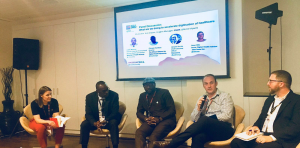Rwanda – the land of a thousand hills. The country has come a long way in the past 24 years. When I get out of my taxi in downtown Kigali, situated between two mountains over 1,800 meters altitude, I’m surrounded by modern buildings. A look on my mobile phone shows me that I have 3G connection. Rwanda, a country of 12.4 million people, reported 8.5 million mobile connections at the end of 2017. As the landlocked country has limited natural resources and a highly dense population, the government developed an ambitious strategy called the Smart Rwanda Master Plan with policies on broadband for all, digital literacy, cybersecurity, digital health, education, governance, data revolution, trade, finance and innovation in the 4th industrial revolution in order to provide better, faster and more secure services to all Rwandans. The past few years have shown significant progress towards widespread ICT adoption in sectors such as health, government, education, agriculture, business and finance. This progress stands in stark contrast with a 38% stunting rate and an average of 0.064 physicians per 1,000 inhabitants (compared to 2.8 in the UK for example). So this promises to be an interesting setting for our session “Digital health at scale: key considerations for developing markets” at m360 Africa this year.
Our first speaker is JP Nsengimana, Special Advisor for Smart Africa and former Cabinet Minister of Youth and ICT in the Government of Rwanda who actually led the design and implementation of the formerly mentioned Smart Rwanda Master Plan. Nsengimana sees government engagement as one of the key success factors in scaling digital health. He strongly believes in a common approach of the Ministry of Health, ICT and Finance to tackle today’s health problems, but at the same time encourages the public health sector to take the lead: “The initiative needs to come from the public health sector. But we can be more open to innovations from the private sector: the solutions are already there!” The role of the government should then be to support these initiatives and create an enabling environment. Whereas leadership and coordination is needed to reduce overlap in this area, Nsengimana strongly advocates that competition can also be healthy and encourage innovation.
Nsengimana highlights a mismatch between the digital solutions provided for the health sector and what it actually needs. Investing more in capacity building would enable people to make better informed decisions that will then lead to better and more tailored integrated solutions. This will then help inform budget owners (in most cases the Ministry of Finance) to re-allocate some of the budget into digital health. One way forward could also be to design academic degrees that join public health with digital technology to create sensible solutions to existing health sector problems. “Find people from the public sector that are champions and bring them together with tech people! I like to see more public sector people coming into this space; health people have a different culture and a different language compared to tech people. The best thing that can happen to the health sector will be digitisation!”
Our panel is a mix of representatives from the Rwandan Ministry of Health (Zuberi Muvunyi), private sector (Jacques de Vos from Mezzanine, a Vodacom subsidiary) as well as the Global Digital Health Network (Steve Ollis) and the African Alliance of Digital Networks (Olasupo Oyedepo).
We hear from Muvunyi that Rwanda technically has the infrastructure to implement digital health solutions: 4G, optic fibre, country-wide mHealth solutions – but the key issues are integration and lack of interoperability between the different players and systems and lack of collaboration with the private sector.
Oyedepo picks up the point on private sector involvement and says that the best innovations are usually driven by companies and start-ups that have to make money to survive – if a solution is not financially sustainable, it will disappear automatically. The role of the government on the other hand is to develop the right policies and regulations to level the playing field.
De Vos tells us more about Mezzanine’s Stock Visibility Solution which enables health facilities to transition from inefficient paper-based stock reporting processes to digital data collection and real-time reporting, thereby maximising the amount of patients who get the medicine they need when they need it and minimising stock loss due to expiration. He highlights the importance of government support and alignment between all stakeholders involved in scaling digital health solutions nationally. In this context, he stresses the importance of honest brokers such as the Global Digital Health Network and the African Alliance of Digital Health Networks – someone who is neutral and can help bring all parties together.
The Global Digital Health Network is a 3000+ person-strong networking forum bringing together donors, private and public sector and sharing lessons learned. Ollis emphasises cost effectiveness and sufficient evidence of what works and what doesn’t. For example, if a clinic has to close to allow staff to do the necessary paperwork manually, that should be sufficient justification to invest in digitised records. To prevent having to re-invent the wheel, the Global Digital Health Network shares its insights via webinars and facilitates dialogue between the different entities involved.
All in all, the very engaged and lively discussion emphasises that the only way forward to scaling digital health solutions is to bring all the different stakeholders, including governments, public and private sector, to the same table, as discussed at Mobile Word Congress this year. The discussion highlighted several issues that need to be addressed to enable a fully interoperable and sustainable digital health system in developing markets. These will be shared in more detail in Part 2 of this blog series. To find out more about the digital healthcare landscape in developing countries as well as the role and opportunities for mobile operators and the importance of leveraging their multiple assets within public-private partnership framework, check our recent report ‘Scaling Digital Health in Developing Markets’.


